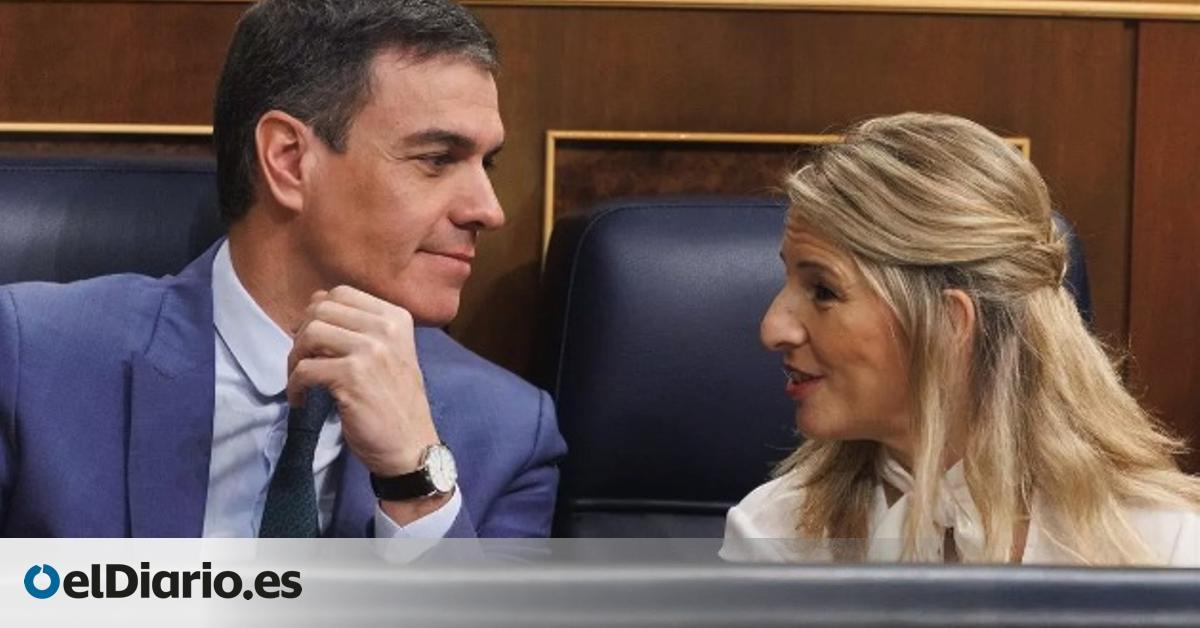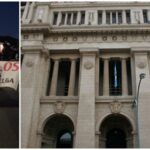
In an electoral Spain split in half, everything can be decided this Sunday by a few thousand votes. Just two months ago, the PP was 3.4 points ahead of the PSOE and, after agreeing with Vox in all the municipalities and autonomies where necessary, it dyed the map blue and reached the highest levels of institutional power in its history. This 23J is presented as a second round for Alberto Núñez Feijóo and will decide whether the claim to “repeal sanchismo” that gave such good results to the right on May 28 (and twice before in Madrid, and also in Andalusia) is effective now, when the effects of the policies where the extreme right has entered are beginning to be known.
Sánchez and Díaz revolt against Feijóo’s hoaxes and his alliances with the extreme right at the end of the campaign
Further
Despite not presenting more programmatic offer than that, the PP and its new leader, Alberto Núñez Feijóo, who has been in the noble plant of Genoa 13, are favorites in all the polls and more from the turn of May, but in the last week the democopic institutes point a mobilization of the left that tries to deal with that other half -hypermovilized country As soon as possible.
The vote by mail that the popular ones questioned -Feijóo pointed directly to the fact that the heads of the public company that he himself chaired did not want it to be voted- has broken all records and has been distributed with hardly any incidents, although as so many times, the electoral board had to extend the deadline until the same Friday of the closing of the campaign. Despite the unprecedented nature of the date, the penultimate Sunday in July, participation is expected to be high, according to the polls.
Sánchez, the supervillain portrayed by the right-wing and whom many considered dead on the night of the municipal elections, anticipated the elections the following morning and carried on his back the weight of a campaign in which the former president of the Government, José Luis Rodríguez Zapatero, turned. With the majority of the barons in mourning for the regional results, Sánchez and Zapatero fought on the most adverse stations and sets, which the president had barely set foot in the last five years. With the lesson learned from the previous campaign – where almost only ETA and Bildu were discussed – the Socialists placed the proposals in the background and focused on combating the hoaxes of the right and the struggle with the popular candidate, who was already seen in La Moncloa. There was an atmosphere of comeback during the first days but it was cut short in the face-to-face with Atresmedia. Sánchez lost in the most crucial debate of all, the worst of those he has starred in since he became the PSOE general secretary, but the resounding victory that many media gave Feijóo had side effects for the PP leader: in the following days it was seen that several of his supposedly winning arguments were lies. And, although his team took care to veto the interviews in uncomfortable media (he did not grant them to elDiario.es, but neither to El País nor to Infolibre or Público), his strategy ran aground on Televisión Española, when the journalist Silvia Intxaurrondo debunked the myth that the PP had always raised pensions according to the CPI. Feijóo challenged the presenter but she kept her information. The conclusion is that she was right and Feijóo was not.
.@NunezFeijoo: “Our party has never stopped revaluing pensions. The only one that did so was the PSOE. By the way, Sánchez was a deputy” @SIntxaurrondo: “It is not correct. They did not do it in 2012, nor in 2013 nor in 2016” https://t.co/W2XU5eYbgg#LHNúñezFeijóo pic.twitter.com/k6AXv1e5QV
— The Hour of 1 (@LaHoraTVE) July 17, 2023
It was not another skid, firstly because of the belligerence that the candidate showed with the journalist encouraging her to apologize, something that the popular leader did not do, but above all because until then the axis of the PP campaign consisted of presenting Sánchez as a lying president in front of his irreproachable candidate who promoted “the value of the truth”. Feijóo had to admit in the following hours that he had been wrong in the interview on public television, to underline, straight away that he can make “inaccuracies” but he is not lying. Inaccuracy or lie, he had used the pension data in interviews and in half a dozen rallies, which had followed a similar script and which included other falsehoods (voluntary or not) about the hours worked in Spain, the responsibility for the collapse of the boxes, the VAT on hairdressers, but fundamentally about a slogan: his supposed conviction that the list with the most votes should govern… at a time when the PP was agreeing against the winner of the elections in Extremadura, the Canary Islands, Toledo, Valladolid and a long list of municipalities.
The other great novelty on the left, compared to the campaign two months ago, is Sumar. This time the coalition to the left of the PSOE represents 15 parties that do not compete with each other, with the second vice president, Yolanda Díaz at the helm. The coalition, which had to close in a hurry in two weeks, has a candidate well valued in the polls, integrated Podemos, but not Irene Montero, and started hesitantly, with risky promises, such as the universal income of 20,000 euros for young people, which is not even shared by the entire left.
After a first week in which it was difficult for him to find focus, Díaz looked for a melee with Feijóo in the final sprint, a political rival he knows well and with whom he had already measured himself in his years in Galicia (Feijóo had always won). The vice president who exhibited during this legislature her most pactist and institutional profile rolled up her sleeves to fight the PP candidate. She was the first to point out the elephant in her room: her years of friendship with Marcial Dorado, a scandal never clarified by the PP leader. Díaz alluded to the mothers of drugs, to the generation of young people who died while the current candidate for La Moncloa sailed the seas of the Balearic Islands, the Canary Islands and the Rias Baixas in the company of one of the biggest smuggling bosses in Europe, convicted of laundering tens of millions of dollars. International media, such as Politico, had already highlighted the suspicious friendships of the PP leader on front pages.
Marcial Dorado enters the campaign
Since then, the matter of Marcial Dorado, the years of friendship when Feijóo was already nnumber of of the Ministry of Health in the first government of Fraga in Galicia, and the lost contracts of the companies with the capo have marked the last hours of the campaign. And in a setting that is not hostile to the PP, such as Carlos Herrera’s studio at La Cope, Feijóo stepped on the last big puddle of the campaign. Herrera had taken all importance from those years of trips to the sea and the mountains of Feijóo and Dorado but despite everything he gave the popular candidate the opportunity to explain himself, who uttered this phrase: “At that time he was a smuggler, I mean, when I met him, he had been a smuggler, never a drug trafficker.”
Quickly, from the rest of the parties they again asked for explanations and accused Feijóo of relativizing the crimes of smuggling and money laundering committed by his then partner on trips to the sea and the mountains and year-end celebrations. The PP candidate had already said in La Sexta a few hours before that during those years he never knew what Dorado was doing because then it was not so easy to make people find out about these things because “there was no Google or Internet.” The question continues to kick in a decade after El País revealed those years of relationship: Could a high-ranking official of the Galician Government in the Ministry of Health ignore who Dorado was, who had starred in hundreds of news and television appearances, the most serious being his arrest for Operation Nécora (from which he was finally acquitted)?
Feijóo has not given a convincing explanation in the campaign either. One more doubt that threatens Feijóo’s speech and his supposed defense of the truth in politics. “If I lie, kick me out of the party,” he went so far as to say on Thursday at a rally in Madrid.
If in the acts of the municipal and regional elections the wind was blowing tail for the PP, in recent days a defensive Feijóo has been seen who has not been able to impose the framework.
For the rest, in a campaign in which there was hardly any talk about the programs, it was Vox that made the most noise with its own: suppression of autonomies, widespread tax cuts, dismantling equality networks, questioning international climate agreements. His presentation coincided with the moment in which Feijóo cleared up the doubt: if Vox votes are necessary, it is normal for them to enter the Government. He said it on the Ana Rosa Quintana program and in an interview in El Mundo. Despite everything, he stated that his model is to govern alone. In case the PP needed more clues as to where its partners want to go, Abascal’s rallies include recorded interventions by Meloni and Orban. Unlike Feijóo and Abascal, Sánchez and Díaz announced that they will govern together if the numbers come out to reissue the coalition.
Despite the fact that in the milestones of the campaign all the spotlights pointed to the debate of two or of the four candidates that Feijóo planted, it was the seven-person format on the public channel that led to a greater contrast of proposals. The general photo drew a PP only with Vox and starred in one of the moments of the campaign: when the EH Bildu spokesman, Oskar Matute, replied to Iván Espinosa de los Monteros, when he asked him what he was doing on the days that Eta killed Miguel Ángel Blanco. “I was at a vigil in Ermua asking for your freedom, where were you? He replied, leaving the spokesman for the extreme right in silence. The fight between Bildu and the PNV in Euskadi is another of the unknowns of the day. Like the results of Catalonia, where the survey of the CEO, the survey body, highlights a strong recovery of the PP, on the brink of a tie with ERC and Junts for second place, far behind the PSC.
It remains to be seen what effect these last few weeks will have on the result. because those of this July 23 are a single election, but several campaigns converge in them, not only the one of the last 15 days. The most influential is already five years old and has to do with those right-wing (not only the political) that have considered the government (the coalition and the previous one) illegitimate and that have waged an all-out war against it (to which some media outlets and even certain judges have enthusiastically signed up) without respite even due to the pandemic or the war at the gates of Europe.
In the legislature of the pandemic, from the applause on the balconies to the toilets, from the deaths in nursing homes, the programmatic debate was conspicuous by its absence, except for some initiatives by Sumar and the declaration of intent by the extreme right to demolish any social progress.
The result of 23J will close a long electoral cycle in Spain but it will also serve as a test in Europe to measure the intensity of the reactionary wave that placed Meloni at the head of the Council of Ministers in Italy and catapulted the extreme right as a second force in a country as inauspicious a priori as Sweden, or Orban’s authoritarian drift in Hungary and the anti-immigration policies of Poland and Norway.
––––––––––––––
Our voice is needed more than ever
Without an independent press, they will not be able to resist democratic rights and freedoms and that is why elDiario.es has become a very uncomfortable medium, which some would like to keep quiet about. We are one of the few reference newspapers that remains free, that does not whitewash the ultras or is captured by the right. You, who read us regularly, know it well. Can you imagine what journalism would be like in Spain if elDiario.es did not exist? What would public debate be like without our voice? Can you imagine what Spain we would have?
If you’re worried about what might happen in this country, support us. Today we need you more than ever. Become a member, become a member, of elDiario.es
Source: www.eldiario.es

